-
 The author considers, in this study, that, in case of medical malpraxis in the public health system, it is the Romanian state which has patrimonial liability to the victim patient (through the medical service provider – public institution), according to the Administrative Dispute Law no. 554/2004, and the doctor in default (employee of the medical service provider) shall have a patrimonial liability to such provider (his/her employee), as set forth by article 270 et seq. of the Labor Code.
The author considers, in this study, that, in case of medical malpraxis in the public health system, it is the Romanian state which has patrimonial liability to the victim patient (through the medical service provider – public institution), according to the Administrative Dispute Law no. 554/2004, and the doctor in default (employee of the medical service provider) shall have a patrimonial liability to such provider (his/her employee), as set forth by article 270 et seq. of the Labor Code. -
 Ending a controversy that lasted for two decades (1991-2011), Law no. 62/ 2011 on social dialogue settled, unequivocally, that in case of triggered and / or continued illegal strikes, the parties responsible are the organizers of the strike and all employees participating in such strikes, be they employees or civil servants. Further, the study proceeds to a thorough analysis regarding the legal nature of restoring liability (civil-tort or civil-contractual) of the organizers of such strikes, as well as of the „employees” (employees or civil servants) participating in such strikes, concluding that the first bear civil-tort liability, and the participating employees bear civil-contractual liability.
Ending a controversy that lasted for two decades (1991-2011), Law no. 62/ 2011 on social dialogue settled, unequivocally, that in case of triggered and / or continued illegal strikes, the parties responsible are the organizers of the strike and all employees participating in such strikes, be they employees or civil servants. Further, the study proceeds to a thorough analysis regarding the legal nature of restoring liability (civil-tort or civil-contractual) of the organizers of such strikes, as well as of the „employees” (employees or civil servants) participating in such strikes, concluding that the first bear civil-tort liability, and the participating employees bear civil-contractual liability. -
 In this study the author points out that, although in Romania we can not talk about a real regime of liability for the inconveniences of neighbourhood, but rather about an identity between this form of liability and the one for the abuse of law, however the social, economic, cultural realities, etc. impose such regulation. From a legal point of view, there is no exact definition of this notion, reference being often made in the legal doctrine to the sociological studies that have examined neighbourhood relations or to geographic studies, in which it is contained the essence of this notion from a spatial point of view. The author points out that neighbourhood can be defined as a state of facts that captures the co-existence of some persons, of some assets, whether movable or immovable, configuring those spaces of conflict and discussing proximities and distances. The Civil Code establishes precise rules on environmental protection and good neighbourliness, considered to be legal limits to private property right, thus, according to the provisions of Article 603 of the Civil Code: „The property right imposes the compliance with the duties concerning the environmental protection and the ensuring of good neighbourliness, as well as the compliance with the other duties which, according to law or custom, belong to the owner.” The new regulation nuances certain aspects which, in practice, raise many problems; the following are examples: the use of waters, the roof droplet, the distance and the intermediate works for certain constructions, works and plantations, the view of the neighbour’s property, the right of passage, and finally the judicial limits are regulated. These judicial limits determine expressis verbis the consequences of exceeding the normal boundaries of the neighbourhood, more precisely, if the owner causes, by exercising his right, greater inconveniences than the normal one in the neighbourhood relations, the court may, on grounds of equity, compel him to pay compensation for the benefit of the injured person, and to restore the previous situation whenever possible.
In this study the author points out that, although in Romania we can not talk about a real regime of liability for the inconveniences of neighbourhood, but rather about an identity between this form of liability and the one for the abuse of law, however the social, economic, cultural realities, etc. impose such regulation. From a legal point of view, there is no exact definition of this notion, reference being often made in the legal doctrine to the sociological studies that have examined neighbourhood relations or to geographic studies, in which it is contained the essence of this notion from a spatial point of view. The author points out that neighbourhood can be defined as a state of facts that captures the co-existence of some persons, of some assets, whether movable or immovable, configuring those spaces of conflict and discussing proximities and distances. The Civil Code establishes precise rules on environmental protection and good neighbourliness, considered to be legal limits to private property right, thus, according to the provisions of Article 603 of the Civil Code: „The property right imposes the compliance with the duties concerning the environmental protection and the ensuring of good neighbourliness, as well as the compliance with the other duties which, according to law or custom, belong to the owner.” The new regulation nuances certain aspects which, in practice, raise many problems; the following are examples: the use of waters, the roof droplet, the distance and the intermediate works for certain constructions, works and plantations, the view of the neighbour’s property, the right of passage, and finally the judicial limits are regulated. These judicial limits determine expressis verbis the consequences of exceeding the normal boundaries of the neighbourhood, more precisely, if the owner causes, by exercising his right, greater inconveniences than the normal one in the neighbourhood relations, the court may, on grounds of equity, compel him to pay compensation for the benefit of the injured person, and to restore the previous situation whenever possible. -
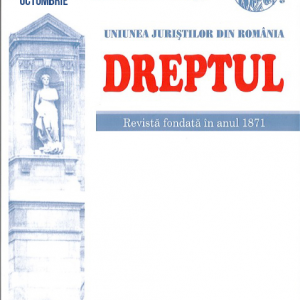 After the entry into force of the new Civil Procedure Code and of the new Criminal Procedure Code, the problem of the judicial institution of the liability of the State and of the magistrates for the prejudices caused by judicial errors still remains controversial and unclarified, further generating doctrinaire and jurisprudential controversies. In this context, this study intends, in relation to the current legal context, to make an analysis of a few controversial problems regarding the liability of the State and of the magistrates for the prejudices caused by judicial errors, aiming, in particular, at the forms of liability of the magistrates, the legal nature of the labour relation of the magistrates, the legal nature of the liability of the State for the prejudices caused by judicial errors, the procedure of engaging the liability of the State and the action for regress brought by the state against magistrates.
After the entry into force of the new Civil Procedure Code and of the new Criminal Procedure Code, the problem of the judicial institution of the liability of the State and of the magistrates for the prejudices caused by judicial errors still remains controversial and unclarified, further generating doctrinaire and jurisprudential controversies. In this context, this study intends, in relation to the current legal context, to make an analysis of a few controversial problems regarding the liability of the State and of the magistrates for the prejudices caused by judicial errors, aiming, in particular, at the forms of liability of the magistrates, the legal nature of the labour relation of the magistrates, the legal nature of the liability of the State for the prejudices caused by judicial errors, the procedure of engaging the liability of the State and the action for regress brought by the state against magistrates. -
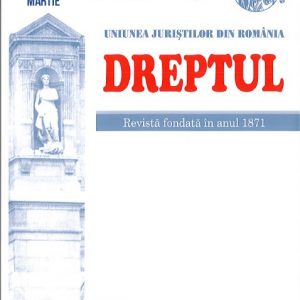 In this study, the author analyzes the change occurred with regard to the response to the statement of defence, by point 27 of the Law No 310/2018 amending and supplementing the Law No 134/2010 on the Civil Procedure Code, as well as for amending and supplementing other normative acts. In the old Civil Procedure Code this act of procedure was not regulated, but it was customary to submit a response to the statement of defence. The author presents how the act of procedure called the „response to the statement of defence” has been regulated, being introduced by the Law No 134/2010 on the Civil Procedure Code. Initially, in Article 201 (2) of the Civil Procedure Code, it was provided the obligativity of the applicant to submit the response to the statement of defence, after having communicated it. This obligation postponed the setting of the first trial term. The obligation to formulate a response to the statement of defence was also provided in Article 471 (6) of the Civil Procedure Code, for the settlement of the means of appeal, as well as in Article 490 (2) of the Civil Procedure Code, for the settlement of the extraordinary remedy of the review. As regards the appeal and the review, the provisions of the Civil Procedure Code have not entered into force, but it has been applied the intermediary regime regulated by Article XV (4), for the appeal, and Article XVII (3), for the review, of the Law No 2/2013 on some measures to relieve the courts, as well as to prepare for the implementation of the Law No 134/2010. By point 27 of the Law No 310/2018 the facultative character of the response to the statement of defence was enshrined. This amendment has also been extended to the case of settlement of the appeal and of the review. The author presents the arguments for which she considers that the legislator should have abandoned this procedural act, being sufficient to express the position of the applicant by way of the request for summons and of the defendant by way of statement of defence. The conclusions of the study are reflected in the opinion that the response to the statement of defence is not justified in the civil trial, creating an imbalance between the parties, the applicant being able to justify his claims both by the request for summons and by the response to the statement of defence, while the defendant has available only the statement of defence. Even if by abandoning the binding character of the response to the statement of defence, the fixing of the first term, respectively that for appeal and for review, takes place more quickly, the author proposes to fully abandon this act of procedure and considers that the legislator should have repealed the response to the statement of defence.
In this study, the author analyzes the change occurred with regard to the response to the statement of defence, by point 27 of the Law No 310/2018 amending and supplementing the Law No 134/2010 on the Civil Procedure Code, as well as for amending and supplementing other normative acts. In the old Civil Procedure Code this act of procedure was not regulated, but it was customary to submit a response to the statement of defence. The author presents how the act of procedure called the „response to the statement of defence” has been regulated, being introduced by the Law No 134/2010 on the Civil Procedure Code. Initially, in Article 201 (2) of the Civil Procedure Code, it was provided the obligativity of the applicant to submit the response to the statement of defence, after having communicated it. This obligation postponed the setting of the first trial term. The obligation to formulate a response to the statement of defence was also provided in Article 471 (6) of the Civil Procedure Code, for the settlement of the means of appeal, as well as in Article 490 (2) of the Civil Procedure Code, for the settlement of the extraordinary remedy of the review. As regards the appeal and the review, the provisions of the Civil Procedure Code have not entered into force, but it has been applied the intermediary regime regulated by Article XV (4), for the appeal, and Article XVII (3), for the review, of the Law No 2/2013 on some measures to relieve the courts, as well as to prepare for the implementation of the Law No 134/2010. By point 27 of the Law No 310/2018 the facultative character of the response to the statement of defence was enshrined. This amendment has also been extended to the case of settlement of the appeal and of the review. The author presents the arguments for which she considers that the legislator should have abandoned this procedural act, being sufficient to express the position of the applicant by way of the request for summons and of the defendant by way of statement of defence. The conclusions of the study are reflected in the opinion that the response to the statement of defence is not justified in the civil trial, creating an imbalance between the parties, the applicant being able to justify his claims both by the request for summons and by the response to the statement of defence, while the defendant has available only the statement of defence. Even if by abandoning the binding character of the response to the statement of defence, the fixing of the first term, respectively that for appeal and for review, takes place more quickly, the author proposes to fully abandon this act of procedure and considers that the legislator should have repealed the response to the statement of defence. -
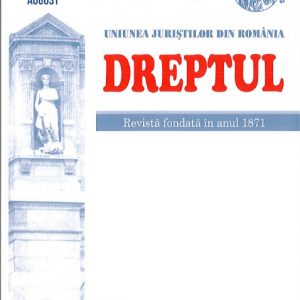 Our paper suggests exploitation of interrogations such as rationality is a concept: primitive, as is customary? tautological, „is what we all know it”? monolithic, homogeneous substance? immutable, not counting history, man, practice and does not support self-critical approach? operational tool to be opposed to uncertainty assessment values? mystifying, justifying postfactum a social action animated by various motives? illusory, utopian even, because every time intelligibility is surpassed by reality? The conclusions of our research reveals that juridical rationality should not ignore the experience of rationality but no specific legal phenomenon. It is multidimensional and confirms its status only if it is based on logic and the history and practice of integrated social experience, procurement of modern science, gives satisfaction to the human condition this historic time, does not ignore the contradictions within juridical life, aspiration for interrogation, foresight and creativity.
Our paper suggests exploitation of interrogations such as rationality is a concept: primitive, as is customary? tautological, „is what we all know it”? monolithic, homogeneous substance? immutable, not counting history, man, practice and does not support self-critical approach? operational tool to be opposed to uncertainty assessment values? mystifying, justifying postfactum a social action animated by various motives? illusory, utopian even, because every time intelligibility is surpassed by reality? The conclusions of our research reveals that juridical rationality should not ignore the experience of rationality but no specific legal phenomenon. It is multidimensional and confirms its status only if it is based on logic and the history and practice of integrated social experience, procurement of modern science, gives satisfaction to the human condition this historic time, does not ignore the contradictions within juridical life, aspiration for interrogation, foresight and creativity. -
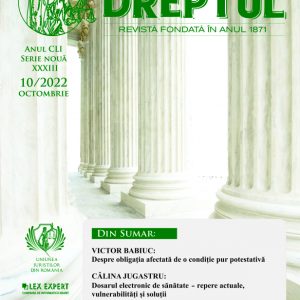 The error of random distribution of a civil case refers, in the matter of means of appeal, unlike the scenarios in which it is necessary to qualify or requalify a means of appeal, only the situation where the will of the party exercising the means of appeal is disregarded, respectively it is not registered on the role of the court of judicial control and, subsequently, randomly distributed the means of appeal exercised by the party, but another means of appeal, due to a genuine error occurred at the time of the registration of the means of appeal or, as sometimes happens in the judicial practice, because at the time of the registration of the means of appeal it is assessed that the party did not exercise the means of appeal provided by law, thus proceeding to the registration of the means of appeal provided by law, which should have been exercised by the party, and not of the means of appeal that was actually exercised.
The error of random distribution of a civil case refers, in the matter of means of appeal, unlike the scenarios in which it is necessary to qualify or requalify a means of appeal, only the situation where the will of the party exercising the means of appeal is disregarded, respectively it is not registered on the role of the court of judicial control and, subsequently, randomly distributed the means of appeal exercised by the party, but another means of appeal, due to a genuine error occurred at the time of the registration of the means of appeal or, as sometimes happens in the judicial practice, because at the time of the registration of the means of appeal it is assessed that the party did not exercise the means of appeal provided by law, thus proceeding to the registration of the means of appeal provided by law, which should have been exercised by the party, and not of the means of appeal that was actually exercised. -
 An employment contract is decisively characterized by the relationship of subordination between the parties, which distinguishes it from a civil contract. The reclassification of a civil contract as having the legal nature of an employment contract can be done by the labour law court, by the fiscal control body and, more recently, even by the labour inspector. The paper analyzes the criteria under which such reclassification can intervene, what are its traps and its effects. It is finalized with a series of proposals aimed at simplifying the reclassification operation, as well as providing legal certainty.
An employment contract is decisively characterized by the relationship of subordination between the parties, which distinguishes it from a civil contract. The reclassification of a civil contract as having the legal nature of an employment contract can be done by the labour law court, by the fiscal control body and, more recently, even by the labour inspector. The paper analyzes the criteria under which such reclassification can intervene, what are its traps and its effects. It is finalized with a series of proposals aimed at simplifying the reclassification operation, as well as providing legal certainty. -
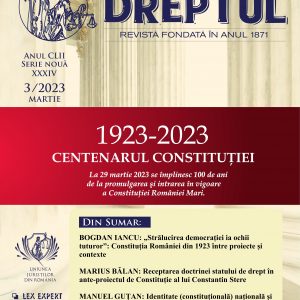
-
 The supremacy of the Constitution has as main consequence the compliance of the entire law with the constitutional rules. Guaranteeing the respect for this principle, being essential for the state of law, is primarily an attribute of the Constitutional Court, but also an obligation of the legislature to receive through the normative acts adopted, in content and form, the constitutional rules. The entry into force of the new criminal codes has generated a significant case law of the Constitutional Court concerning the verification of constitutionality of some regulations of the Criminal Code and of the Criminal Procedure Code. Through this study we intend to analyze the following more important aspects: a) how the constitutional principles and values have been materialized in some criminal rules and criminal processual rules of the new codes; b) the effects of the decisions of the Constitutional Court in the process of constitutionalisation of the criminal law; c) applying the decisions of the Constitutional Court in the judicial activity, especially those which have established the unconstitutionality of some regulations in the new criminal codes.
The supremacy of the Constitution has as main consequence the compliance of the entire law with the constitutional rules. Guaranteeing the respect for this principle, being essential for the state of law, is primarily an attribute of the Constitutional Court, but also an obligation of the legislature to receive through the normative acts adopted, in content and form, the constitutional rules. The entry into force of the new criminal codes has generated a significant case law of the Constitutional Court concerning the verification of constitutionality of some regulations of the Criminal Code and of the Criminal Procedure Code. Through this study we intend to analyze the following more important aspects: a) how the constitutional principles and values have been materialized in some criminal rules and criminal processual rules of the new codes; b) the effects of the decisions of the Constitutional Court in the process of constitutionalisation of the criminal law; c) applying the decisions of the Constitutional Court in the judicial activity, especially those which have established the unconstitutionality of some regulations in the new criminal codes. -
 Under the study hereby, the author sets under review the institution of “recidivism” in the light of the new Criminal Code. Essentially, highlighting new issues both in relation to the definition and the terms of recidivism, and as regards punishment. Therefore, the terms of recidivism have been amended (limits thereof have been extended), and the sanctioning treatment was simplified. Also, the author notes the fact that the legislature does not make a distinction, in terms of conditions, between post-release recidivism and the post-sentencing recidivism, nor between low recidivism and high recidivism, the old rules being grouped in a single way.
Under the study hereby, the author sets under review the institution of “recidivism” in the light of the new Criminal Code. Essentially, highlighting new issues both in relation to the definition and the terms of recidivism, and as regards punishment. Therefore, the terms of recidivism have been amended (limits thereof have been extended), and the sanctioning treatment was simplified. Also, the author notes the fact that the legislature does not make a distinction, in terms of conditions, between post-release recidivism and the post-sentencing recidivism, nor between low recidivism and high recidivism, the old rules being grouped in a single way. -
 This study examined in a comparative manner the provisions of the Council Framework Decision 2008/675/JHA of 24 July 2008 compared to the Romanian internal provisions related to taking into consideration the criminal convictions decided in another European Union Member State, in the circumstances in which in another Member State a new criminal lawsuit is being initiated against the same individual, but for different facts. The investigation is important since the above mentioned European normative act is classified in the broad range of measures taken for the purpose of the harmonization of laws in the field of judicial cooperation in the criminal matter within the Member States, and the Romanian laws have not been adjusted yet to the European legislative system. Based upon the investigation carried out by the authoress, it results that both the examined European normative act and the internal laws in the matter have certain lacks and for this reason their amendment and supplement is required. The essential contribution of the study shall consist in the examination of certain judicial rules and the identification of certain situations which have to be regulated either by supplementing the European normative act, or by the adoption of another instrument, the same situation being valid as regards the Romanian laws, as well.
This study examined in a comparative manner the provisions of the Council Framework Decision 2008/675/JHA of 24 July 2008 compared to the Romanian internal provisions related to taking into consideration the criminal convictions decided in another European Union Member State, in the circumstances in which in another Member State a new criminal lawsuit is being initiated against the same individual, but for different facts. The investigation is important since the above mentioned European normative act is classified in the broad range of measures taken for the purpose of the harmonization of laws in the field of judicial cooperation in the criminal matter within the Member States, and the Romanian laws have not been adjusted yet to the European legislative system. Based upon the investigation carried out by the authoress, it results that both the examined European normative act and the internal laws in the matter have certain lacks and for this reason their amendment and supplement is required. The essential contribution of the study shall consist in the examination of certain judicial rules and the identification of certain situations which have to be regulated either by supplementing the European normative act, or by the adoption of another instrument, the same situation being valid as regards the Romanian laws, as well.
